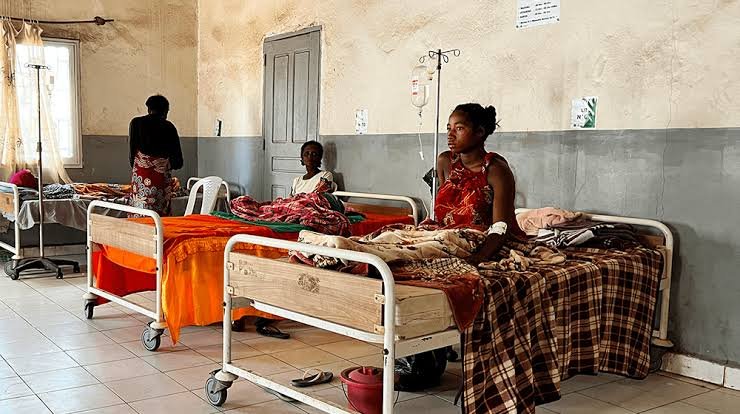By Alpha Amadu Jalloh
They say love has no price. But in the corridors of pain, where hope clings to a medical report and salvation hides behind the counter of a hospital pharmacy, that love is tested. Shredded by poverty. Wept upon. Bargained with on credit, on trust, on prayers, and sometimes on nothing but desperation.
There came a time in two parents’ lives when strength was no longer measured by muscle or money but by how long they could pretend everything was okay while their child slowly slipped away. They had lived through that torment. They had walked barefoot across the tiled hallways of a government hospital, clutching tightly to a worn out prescription, “di ospitul paper,” as though it were the last hope of their child. But in truth, it was just a list. A cold enumeration of drugs and treatments far beyond their reach.
They had watched nurses, exhausted and emotionally detached, hand them the paper without eye contact. And they had walked out, not towards the pharmacy but towards the world. To beg. To plead. To run from contact to contact, message to message. Not for privilege. Not for vanity. But for medicine. For mercy. For one more breath in the fragile chest of their child.
The sleepless nights were not just sleepless. They were torture sessions disguised as silence. Each night stretched endlessly, marked not by hours but by every faint cough and weak moan from the hospital bed. The parents sat helplessly, counting the seconds between their child’s shallow breaths. The doctors came and went. White coats. Confident postures. But their eyes betrayed their resignation. They spoke in codes, in prescriptions, in protocols. And when the parents asked what could be done, they said, “Bring these drugs.” Then they handed them “di ospitul paper.”
But what if the parents could not afford what was written on that paper? What if they had already borrowed from every friend who once believed in them? What if even the roadside tea seller frowned at the sight of them approaching again? What if their phones were full of unanswered messages, unread pleas, and unseen cries? What if their child’s life was now held hostage by poverty?

The days were short. Not because time moved faster but because too much needed to be done with nothing in hand. They dashed from place to place, juggling fear and hope, calculating how many tablets they could buy with the little they had. Every trip outside the hospital was a gamble with death. Every delay was a prayer for time to wait.
And then came the betrayals. The ones that shattered them. Family members they once trusted arrived too late. Not to help but to judge. Not to offer solace but to provoke. They questioned their decisions. Mocked their choices. Measured their worth by the suffering in their eyes. “Why didn’t you say anything earlier?” “What kind of parents are you?” “Maybe you’re exaggerating.” But those relatives had never held a dying child in their arms while calculating the price of medicine.
They did not know what it felt like to watch a child die in slow motion. To be told, “We’ve done all we can,” when no attempt had been made because the parents could not pay. To see other patients treated first, not because they were sicker but because they were richer. And when the parents raised their voices, they were reminded of protocols and hospital rules but never once were they shown compassion.
The system had no mercy. The prescription wasn’t just for medicine. It was for a kind of suffering no parent should endure. The support system that should have saved them had long collapsed. What remained were myths and memories. Echoes of promises from community leaders and NGOs who were nowhere to be found.
They thought of Mama. They thought of Papa. They thought of Aunty. Of Sister. Of their daughter. And they whispered, oh Mama, oh Papa, oh Aunty, oh Sister, oh my daughter. How did we get here?
How did a society allow survival to depend on begging? How did dignity become a trade off for antibiotics? How did the strongest among us become those who suffered the most in silence?
This story was not just theirs. It was the story of countless mothers who walked barefoot to clinics with dying children on their backs. It was the story of fathers who sold the last piece of land, the last goat, or the last radio to buy a single vial of hope. It was the story of a nation where hospitals had become death zones for the poor.
They once heard leaders say that children are the future. But how can there be a future when the children are dying for lack of basic care? How can any nation rise when a medical prescription becomes a death sentence for the underprivileged?
They did not blame the doctors or the nurses. They too were prisoners of a broken system. But they blamed the silence of society. The quiet comfort of those who could help but chose to look away. The indifference of a government that sends its officials abroad for medical care while their people bleed on rusted hospital beds.
To those who showed up too late, they offered no hatred. Only a warning. If you must come, come early. Come not to witness death but to help prevent it. Bring food. Bring medicine. Bring hope. But bring it before the light fades from a child’s eyes.
> “Whoever saves a life, it is as if he had saved all mankind.”
— Qur’an, Surah Al-Ma’idah 5:32
> “Truly I tell you, whatever you did for one of the least of these brothers and sisters of mine, you did for me.”
— Bible, Matthew 25:40
Because one day, you too may hold “di ospitul paper.” And you will understand how heavy a simple piece of paper can feel when you cannot afford what is written on it. Then you will know what it means to cry. Not because your child is gone. But because help came just too late.
And if you have never lived this pain, do not use another’s misfortune to judge them. Use it to reflect. To act. To advocate for a system where no parent watches a child die while holding a prescription they cannot fulfill.
For every child lost to poverty, a nation loses part of its soul.
For every prescription left unfunded, humanity takes a step backward.
Let no parent suffer in silence. Let no child die because of cost.
Let the prescription be for healing. Not heartbreak.
Let “di ospitul paper” be a promise of life. Not a verdict of death.








